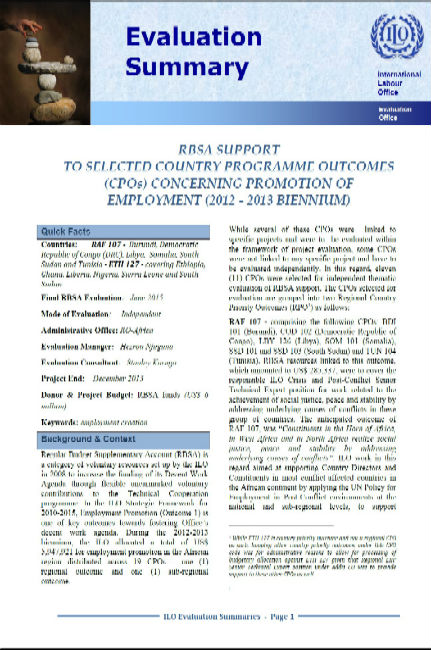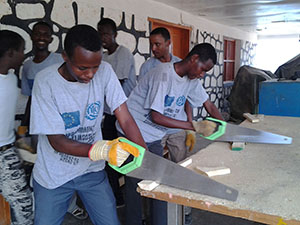Publications
August 2015
-

Success stories from Tourism Enterprises in South Africa
11 August 2015
Case studies from the ILO Sustaining Competitive and Responsible Enterprises
-

SCORE Information brochure
10 August 2015
Snapshot
-

An Action Plan for Youth Empowerment and Employment
03 August 2015
The Action Plan provides strategies to comprehensively address challenges of youth employment and empowerment through a multi-sectoral approach to boost opportunities for employment and empowerment for young women and men.
-

National Plan of Action for the 2015 Youth Policy
03 August 2015
The National Plan of Action provides an implementation framework for the revised 2015 National Youth Policy for Zambia. The plan offers guidance on how all stakeholders can mainstream youth development issues within their sectors in line with the Revised Sixth National Development Plan
-

National Youth Policy 2015
03 August 2015
The revised 2015 National Youth Policy for Zambia provides a more responsive approach to youth programming in order effectively address the needs of the youth in tandem with emerging issues in youth development. The policy is driven by the overal goal to provide an enabling environment that promotes the rights and obligations of the youth and foster their participation in national development.
-
Ghana - United Nations Development Assistance Framework (2012-2016)
01 August 2015
The purpose of this cooperation agreement between the Government of Ghana and the UN system in Ghana is to support Ghana in achieving the Millennium Development Goals, advancing equitable economic growth and reducing poverty, through capacity development, strengthening of accountability systems and the delivery of quality social services, with a focus on the most deprived and vulnerable populations.
July 2015
-

Report 2: Roadmap for workplace compliance through labour standards in the member states of the WAEMU, Guinea and Chad
24 July 2015
African countries still face real difficulties in the effective enforcement of labour laws and regulations. ILO member States, particularly those of the UEMOA, often request additional support to help strengthen their capacities. As a result, it has become necessary to adopt a common strategy to help consolidate various ILO interventions in order to pool resources and expertise and thus increase the impact at the country level.
-

Report 1: Expert report on the sub-regional workshop: strategy sharing on workplace compliance through labour standards in member countries of the West African Economic and Monetary Union (WAEMU)
24 July 2015
From 21 to 23 July 2015 in Ougadougou, Burkina Faso, the International Labour Office (ILO) in partnership with the UEMOA organised a sub-regional workshop to develop a common strategy on workplace compliance through labour standards in member states of the West African Economic and Monetary Union (WAEMU).
-

RBSA support to selected Country Programme Outcomes (CPOs) concerning Promotion of Employment during 2012-2013 biennium (RBSA Funded Activity Evaluation Summary)
20 July 2015
Evaluation Consultant: Dr. Stanley Karuga
-

Recovery of the World of Work in Guinea, Liberia and Sierra Leone
08 July 2015
Bringing ILO Support to Decent Work for the Social and Economic post-Ebola Recovery
-

Improvement of Livelihoods of Vulnerable Households in urban and peri-urban areas of Galkayo
05 July 2015
Metal work and wood work play an important role in light engineering sector and the employment potential of the sector;
-

Labour and Non Labour-related Laws for Micro, Small and Medium size Enterprises in Kenya: Facilitators Manual
01 July 2015
This Facilitator’s Manual is part of the tool kit developed under LGN III. This Manual is a resource pack designed to help trainers build their capacity to deliver training modules in the Handbook. The Manual targets policy makers, legal and regulatory development and enforcement institutions, MSMEs, workers, owners of businesses, and Business Development Service providers.
-
Combating the worst forms of child labour in shrimp and seafood processing areas of Thailand (Final evaluation summary)
01 July 2015
Project: THA/10/50/USA - Evaluation Consultants: Amy Catherine Jersild, Nantaporn Ieumwananonthachai and Piyanut Kotsan
June 2015
-

National Employment Policy: Ghana
04 June 2015
The National Employment Policy aims to create decent employment opportunities for the growing labour force of Ghana.
-
Taqeem - International Youth Foundation, Egypt
02 June 2015
This Taqeem Impact Brief documents how the International Youth Foundation in Egypt measures outcomes the Egypt@Work programme, the tools that are applied and the findings and recommendations that emerge to assist them in improving impacts and programme design. Taqeem (“evaluation” in Arabic) is a regional initiative of the ILO that aims to improve labour market outcomes of young people in the Middle East and North Africa by strengthening results measurement and evidence-based policies and programmes.
-

Labour and non Labour-related Laws for the Micro, Small and Medium Size Enterprises in Kenya: Participants Hand Book
01 June 2015
The purpose of this handbook is to facilitate adequate understanding of the Kenyan Labour Laws and Labour Law practices in the MSME sector and progressively create an enabling environment for compliance.
-

ILO DWT/Co- Cairo: 2014/15 Annual Report
01 June 2015
Presents the results of the ILO activities in Egypt and Algiers Offices in 2014
-
CEEP Innovation Fund Capacity Building with MFI's
01 June 2015
The project empowers beneficiaries both economically and personally to address the challenges that arise within the local context.
-
CEEP Case Study File
01 June 2015
The project empowers beneficiaries both economically and personally to address the challenges that arise within the local context.
-
CEEP Tanzania
01 June 2015
The project empowers beneficiaries both economically and personally to address the challenges that arise within the local context.